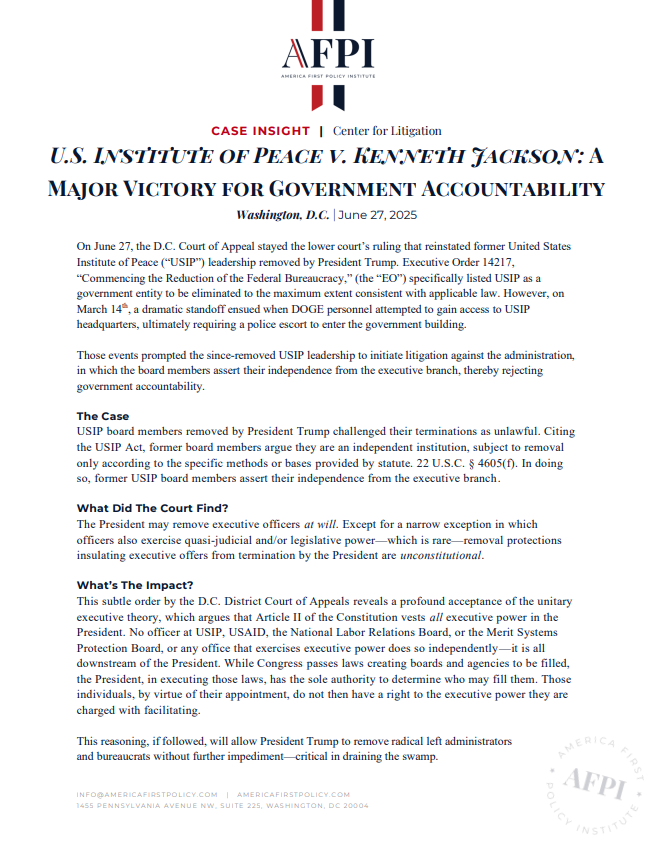U.S. Institute of Peace v. Kenneth Jackson: A Major Victory for Government Accountability
On June 27, the D.C. Court of Appeal stayed the lower court’s ruling that reinstated former United States Institute of Peace (“USIP”) leadership removed by President Trump. Executive Order 14217, “Commencing the Reduction of the Federal Bureaucracy,” (the “EO”) specifically listed USIP as a government entity to be eliminated to the maximum extent consistent with applicable law. However, on March 14th, a dramatic standoff ensued when DOGE personnel attempted to gain access to USIP headquarters, ultimately requiring a police escort to enter the government building.
Those events prompted the since-removed USIP leadership to initiate litigation against the administration, in which the board members assert their independence from the executive branch, thereby rejecting government accountability.
The Case
USIP board members removed by President Trump challenged their terminations as unlawful. Citing the USIP Act, former board members argue they are an independent institution, subject to removal only according to the specific methods or bases provided by statute. 22 U.S.C. § 4605(f). In doing so, former USIP board members assert their independence from the executive branch.
What Did The Court Find?
The President may remove executive officers at will. Except for a narrow exception in which officers also exercise quasi-judicial and/or legislative power—which is rare—removal protections insulating executive offers from termination by the President are unconstitutional.
What’s The Impact?
This subtle order by the D.C. District Court of Appeals reveals a profound acceptance of the unitary executive theory, which argues that Article II of the Constitution vests all executive power in the President. No officer at USIP, USAID, the National Labor Relations Board, or the Merit Systems Protection Board, or any office that exercises executive power does so independently—it is all downstream of the President. While Congress passes laws creating boards and agencies to be filled, the President, in executing those laws, has the sole authority to determine who may fill them. Those individuals, by virtue of their appointment, do not then have a right to the executive power they are charged with facilitating.
This reasoning, if followed, will allow President Trump to remove radical left administrators and bureaucrats without further impediment—critical in draining the swamp.
Does This Impact the America First Agenda?
The results of this case are fully aligned with AFPI’s efforts to ensure government accountability. In fact, AFPI recently launched litigation against USIP, after the agency, under its former leadership, failed to respond to its FOIA request investigating the events on March 17th. This ruling restores accountability and clears the way for government transparency.
